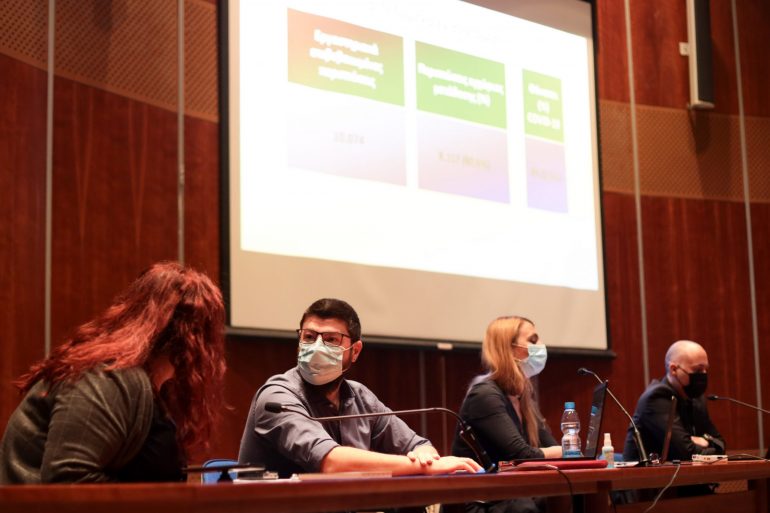The images we all watched over the weekend from places of worship and shops are dangerous and worry us because they affect individual and public health and the effectiveness of any measures we take, said the head of the epidemiological team for the coronavirus, Assistant Professor Konstantinos Tsioutis. At the same time, experts are concerned about the increase in incidents in Nicosia and the outbreak in Famagusta.
At a press conference with the members of the team Dr. George Nikolopoulos and Dr. Zoi-Dorothea Pana, Mr. Tsioutis stressed that it would be good not to see the specific images in the specific phase we are in, adding that one would expect, 9 months after the pandemic , to have understood our individual and collective responsibility, the need to protect ourselves and those around us. It is indicative, he said, that we must re-emphasize our role and responsibility.
Mr. Tsioutis said that we all have to understand that people are sick and want support, that at the moment about 120 of our citizens are being treated and therefore 120 families are in distress and any of our actions, such as those of the weekend, worsen the situation and they should be avoided. He also said that it does not necessarily mean that we should reach the maximum number in one place and called on everyone to put their health and the health of their loved ones in their primary choices.
Day data - Situation in the provinces - Diagnostic tests
Regarding the data of the last few days, Dr. Tsioutis said that the tests have been multiplied and a targeted control is being carried out, which gave us conclusions, both at the local level and at the national level.
He referred to the readiness of the hospitals, pointing out that we did not reach a critical threshold, although we approached it and we are one of the few countries with a fairly large reserve. He stressed, however, that any escalation and any increase in occupancy, means that other services will not be able to be offered at the point and to the extent we want.
Dr. Tsioutis said that a huge number of medical and nursing staff work day and night and they are tired and we must keep this in mind.
He also referred to the important successes recorded by Cyprus which now, perhaps, are not taken into account because we are at a critical level and we see the bad and pessimistic side. However, he stressed, we had a long time in a phase of relaxation without much problem and any outbreaks were controlled by targeted measures, we have reserves in the health system and a huge proportion of laboratory tests in the population, from the highest in the world.
Dr. George Nikolopoulos in his own intervention said that with based on data as of 27/11, it seems that 8 at
10 infections are domestic and the death toll rose to 49. The mortality rate is 0,5% and the daily incidence ranges between 200-250. He said that many tests are performed daily but we can not know the development.
Dr. Nikolopoulos stated that Limassol shows a clear decrease while Nicosia and Famagusta increase, but stressed that the data justify a pan-Cypriot strategy. He added that the daily admissions to hospitals are 9-10 and we are still in high numbers without a recession, with the number of patients, on average, being over 100 per day.
About 17 people are being treated in the ICU, a number higher than the first wave of the pandemic.
He also explained that data on the morbidity burden in an area, the number of reproduction and the percentages of patients are being studied.
According to the data, from November 14 to 27, a total of 1.145 cases were detected in Nicosia, 1.050 in Limassol, and 376 in Larnaca. In the Province of Famagusta, 218 cases were detected, while in the Province of Paphos the picture is improved by only 123 cases.
Of concern is the growing trend in the Province of Famagusta with team members focusing on the fact that epidemiological indicators have surpassed those of Limassol with 452,3 cases per 100,000 population. It is followed by Limassol, which shows a decrease of 428,7 cases per 100,000. An increase is presented in Nicosia, which has the third worst indicators, with 335,1-100,000, Larnaca with 255,8-100,000, while Paphos also showed a small increase with 130,7-100,000.
In his speech, Dr. Tsioutis explained that in data analysis not only indicators are taken into account and
objective criteria, but we combine our observations and our interventions without ever standing on an index.
There is, he stressed, a qualitative analysis, and there are no specific criteria to say that these lead us to relax measures
Source: KYPE
